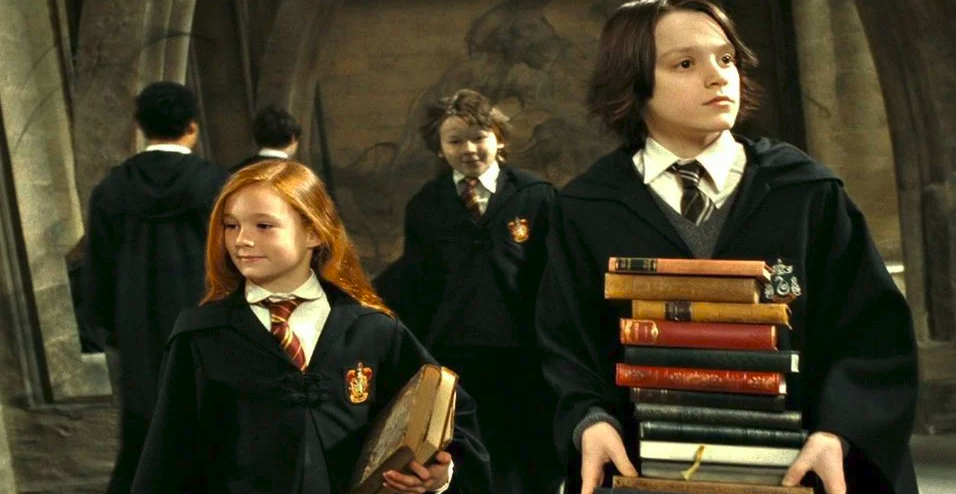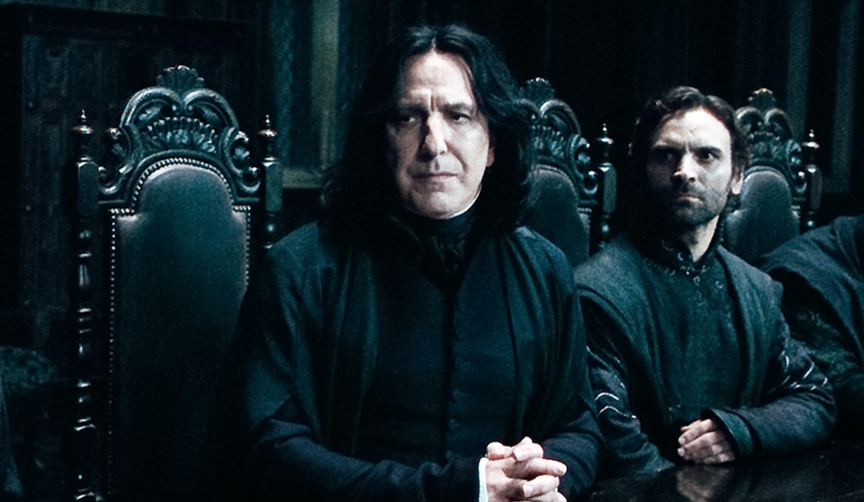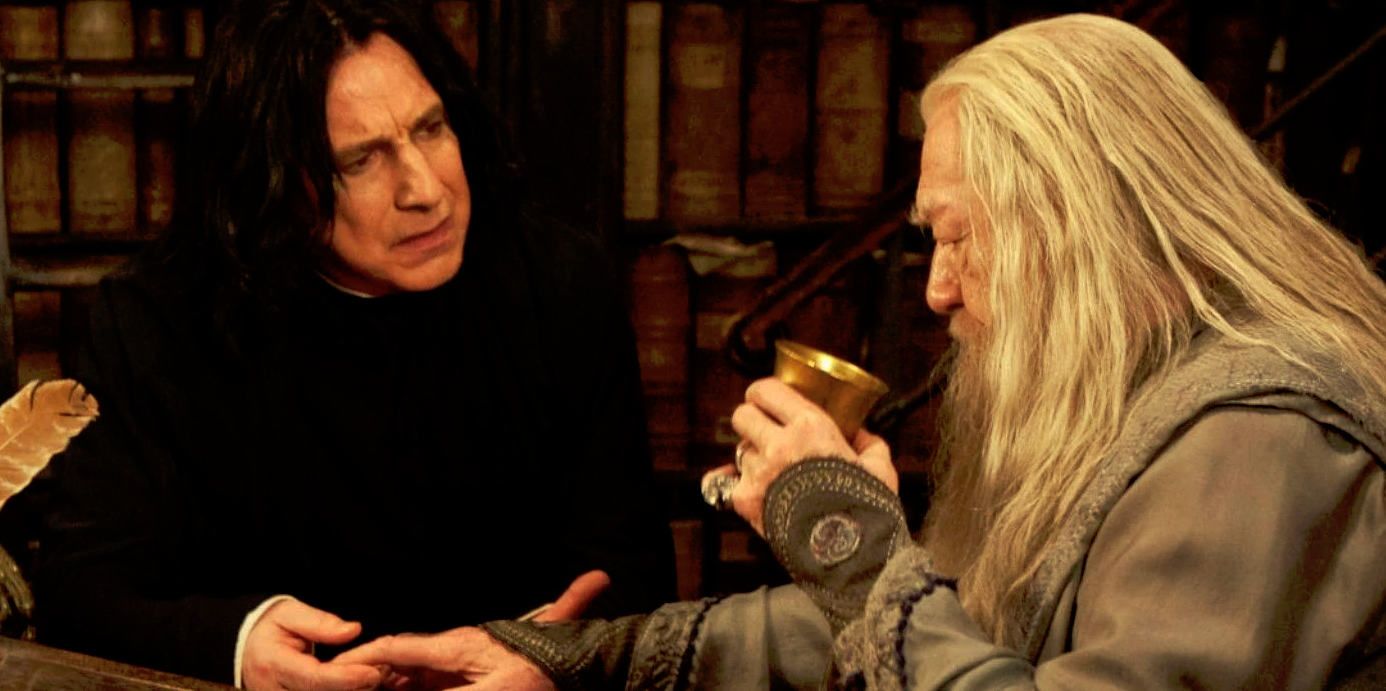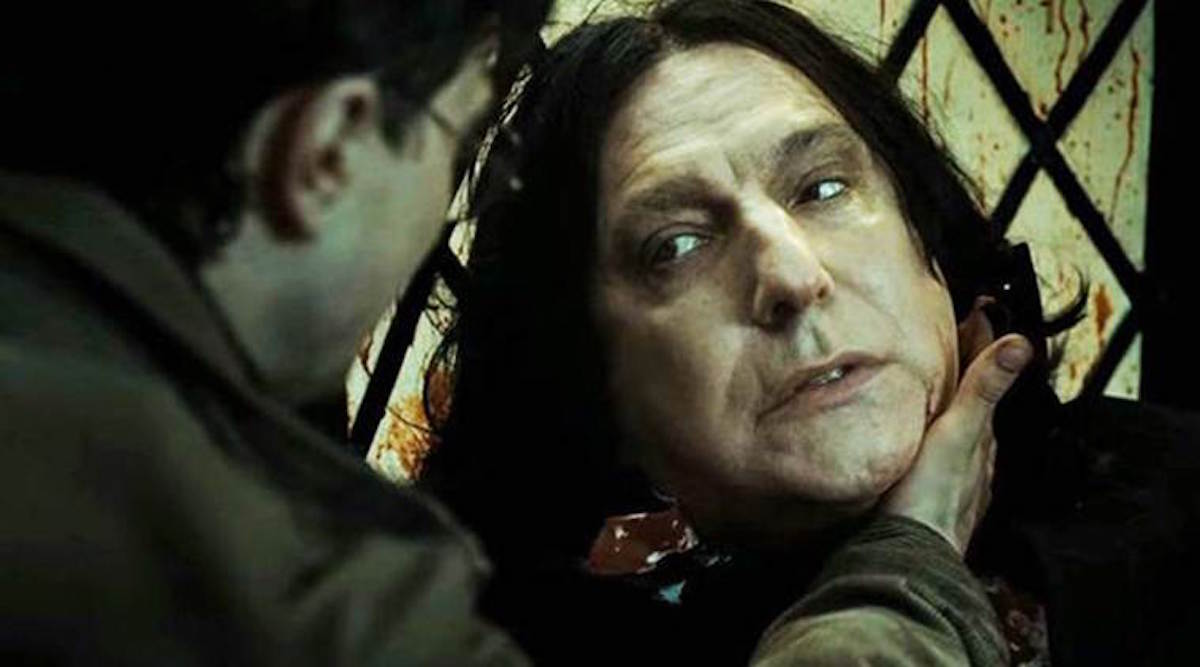Tracing Snape’s Loyalties (From Lily to Voldemort to Dumbledore to Harry)
December 20, 2020—Severus Snape is a complex man, there is no denying. Victoria and I spent both our most recent episode and our upcoming one dissecting various aspects of his character, and there is still plenty we could say. His character arc is defined almost entirely by the people to whom he offers his allegiance at various points in the series, and we can trace the timeline of his loyalties rather clearly throughout his life.
Pre-Lily (1960 – c. 1969)
We’ve discussed on multiple occasions Snape’s unhappy home life, so I won’t belabor the point. While we don’t have an abundance of details regarding what his early childhood is like, we can assume based on the hints we receive and his later behavior that he is a deeply troubled and lonely kid. I’ll leave it at that.
Lily (c. 1969 – 1976)
OK, you caught me. Snape’s loyalty to Lily is not something that ever really ends; it follows him and informs many of his other alliances for his whole life.
When Snape first meets Lily, he is desperate for a friend, for someone to relate to. He finds that in her. Calling them kindred spirits is probably a stretch, given that Lily is exceptionally kind and empathetic, while Snape, even at that age…isn’t. Not even a little bit.

But she is someone his age, with magic (he’s already begun looking down his nose on those without because of his Muggle father), who treats him kindly and acceptingly, and who depends on him for his knowledge of the wizarding world. Is it any wonder that he all but imprints on her?
Had the two been Sorted into the same House, his tale would probably have been a very different one. I personally don’t believe that he and Lily ever would have become a couple (nor would he have become a sociable, well-adjusted person). But I also don’t believe he would have become so heavily immersed in the Dark Arts, and more regular contact with her good influence could have saved him from becoming a Death Eater.
However, that’s not how it happens. He becomes a Slytherin, where he is constantly surrounded by blood purists and Dark Arts enthusiasts and, already predisposed to anger and prejudice, is slowly swayed toward their way of thinking. It all comes to a head at the end of his fifth year, when he crosses the line, and Lily ends their friendship. Snape doesn’t handle it well.
The Rudderless Years (1976 – c. 1978)
We know little about the following years, but much can be supposed. With no competing influence from Lily, the older Slytherins likely gain a stronger foothold in his life and worldview. No longer clinging to the lifeline that Lily represents, Snape sinks into the mire of Voldemort’s ideology.
Voldemort (c. 1978 – c. 1980)

After graduating Hogwarts, Snape becomes a card-carrying Death Eater. Whether he’s misunderstood or not, whether he’s conflicted or not, whether he fully understands what he’s getting into or not, he chooses to join Voldemort and accept the Dark Mark as a sign of his service to Voldemort’s goals and plans. He’s older than Draco Malfoy is when he later joins up, so you cannot hold Malfoy accountable for his decision and absolve Snape of his. They were both old enough to know better.
What his role is as a servant of the Dark Lord is, we do not know. We do know that at some point, he spies on Dumbledore (with uncharacteristic clumsiness), overhears part of a prophecy, and reports what he hears to Voldemort.
Dumbledore (c. 1980 – 1997)
This is when we see the most dramatic shift in Snape’s behavior. While still at Hogwarts, he straddles the fence and tries to enjoy the best of both worlds—Lily’s friendship and the Slytherins’ approbation. When Lily withdraws the former, he falls entirely into pursuing the latter. But when Lily’s life is directly threatened, he has to make a choice, and he chooses to stand between Voldemort and Lily. To do that, he aligns himself with Voldemort’s chief opposition, Dumbledore, and becomes his spy.

Even after her death, he remains at Dumbledore’s side at Hogwarts and vows to protect her son. He opposes Quirrell when he tries to kill Harry and steal the Sorcerer’s Stone (unaware that Voldemort observing each moment first-hand), he informs Dumbledore when the Dark Mark strengthens again, and he returns to Voldemort’s side upon his return (though slightly belatedly) on Dumbledore’s orders.
After convincing Voldemort of his continued loyalty and value as a triple agent (which you’ll hear more about in an upcoming episode), he becomes Dumbledore’s spy once again. He follows Dumbledore to a fault, reluctantly agreeing both to be the one to kill the Headmaster and to forward Dumbledore’s plans for Harry’s martyrdom.
Harry (1997-1998)
Again, it could be argued that Snape’s loyalty to Dumbledore does not end with his death, much as with Lily. His acts in service of Harry’s success in Book 7 are arguably an extension of those other relationships. But the fact remains that, with both the woman he loved and the man he followed gone, Snape spends the last year of his life working to give Harry everything he needs to bring about Voldemort’s final end.


